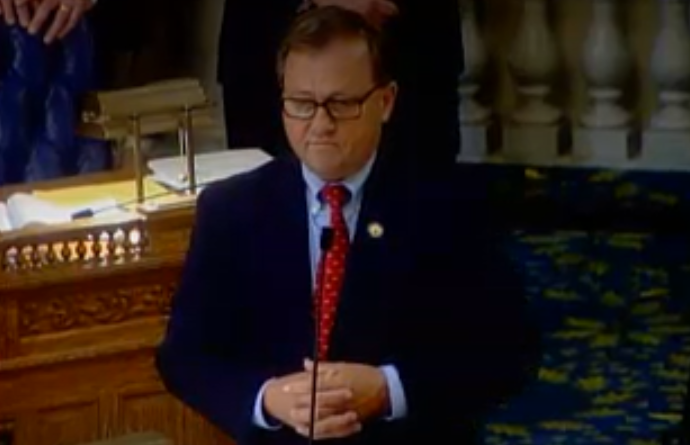Change in education funding would lower property taxes, GOP leader and groups say

TRENTON, N.J. – As Gov. Phil Murphy prepares to unveil his new state budget proposal next week, Assembly Republicans announced plans to fully fund schools while also lowering property taxes alongside business leaders at the Statehouse Wednesday.
“It’s time the state put money where its mouth is,” said Assembly Republican Leader John DiMaio (R-Hunterdon, Warren). “We’ve been talking about school funding and high property taxes since the 1960s with no solution.”
The answer is simple for DiMaio – tie state aid increases to lowering property taxes while meeting funding obligations for the first time.
The plan proposes increasing state education aid by $1.2 billion to fully meet the adequacy budgets of school districts set by the state’s funding formula passed in 2008. In return, districts must lower property taxes dollar for dollar.
“Murphy and the Democrats try to take credit for providing more funding, but the state has never actually met its obligations, and property taxes continue to go up,” continued DiMaio.
DiMaio noted that state education aid increased by more than $650 million last year, while the state also set aside $6.5 billion in surplus padded with nearly $3 billion from the property tax relief fund, which is the primary funding source for school aid. Schools are still shorted more than $500 million of equalization aid – the current state obligation for funding.
“It really isn’t a matter of finances, but political will,” said DiMaio. “The state has the money, but the property tax relief fund constantly gets raided to fund more political pork projects each year.”
Murphy and Democrat lawmakers divvied up more than $1 billion in added spending to pay for favored projects to last year. The added spending helped balloon the state budget to a record $50.6 billion.
DiMaio said Republicans also want to restore school funding cuts under a state law passed in 2018.
“Politics shouldn’t get in the way of a real solution,” expressed DiMaio. “School districts represented by Democrats benefit just as much if not more. This is about solving New Jersey’s bigger issues.”
In the state budget signed by Murphy in June, Jersey City public schools were provided less than 76% of its adequacy budget due to funding cuts by the state. This proposal would bring it back to 100%.
DiMaio worked on the plan for more than a year with education and business leaders.
Eileen Kean, the state director for The National Federation of Independent Businesses, said her group “proudly” endorses the plan.
“Recent property tax reforms have failed to alleviate the high property tax burden small businesses pay,” said Kean. “Just like homeowners, small businesses face unsustainable tax increases. Passage of full school funding will provide equity to all.”
“The state needs economic policies and tax reforms that have a positive impact on African American businesses and their communities. That includes bringing equity to our schools and our economy. This plan recognizes that, and is the reason why the African American Chamber of Commerce of New Jersey supports this bill,” said the chamber’s founder and President John E. Harmon Sr. IOM in a statement.
“There is a strong connection between educational attainment and socioeconomic status,” continued Harmon. “Allowing people to keep more of their money while increasing state aid to schools will improve children’s education, create more economic activity, and begin to turn generational struggles into upward mobility. Business owners can provide more pay or lower prices if they pay less in property taxes, which is exactly what people need to survive and close disparities in New Jersey.”
“New Jersey’s workforce has always been a strength and that starts with our education system. But our workforce also needs a more affordable place to live, and that starts with property taxes,” said Christina Renna, president of the Chamber of Commerce Southern New Jersey. “This proposal will keep our workforce among the best educated in the nation and make their life more affordable.”
“That helps businesses large and small in South Jersey that struggle to find workers or expand because cost continues to get in the way,” continued Renna. “New Jersey’s students and economy will benefit from this plan.”








